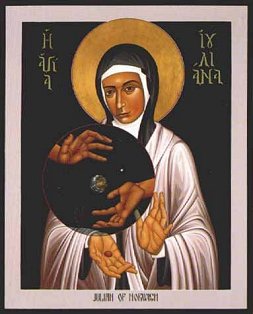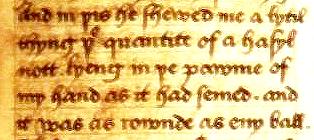Introducing "A Book of Showings" by Julian of Norwich
Ed Friedlander, M.D.
scalpel_blade@yahoo.com
No texting or chat messages, please. Ordinary e-mails are welcome.
 Professor Elizabeth Kirk introduced me to Julian's book
during my first
week at Brown. It was a high point of my undergraduate
career. In modern times, the book has usually been
titled "Revelations of Divine Love".
Julian was little-known in 1969, but nowadays we
hear much more about
this medieval mystic, whose record is considered
by some to be the oldest book in
the English language. ("And by a woman...")
Professor Elizabeth Kirk introduced me to Julian's book
during my first
week at Brown. It was a high point of my undergraduate
career. In modern times, the book has usually been
titled "Revelations of Divine Love".
Julian was little-known in 1969, but nowadays we
hear much more about
this medieval mystic, whose record is considered
by some to be the oldest book in
the English language. ("And by a woman...")
If you have already read Julian's book,
or if you don't want to read a webpage that's a little bit graphic,
you will probably want to go directly to the links.
As a youngster, Julian had prayed to know
exactly what Christ
had suffered during His passion. During a near-fatal illness,
her old prayer was answered in
a near-death experience. It began with seeing blood flow
from under the crown of thorns on a crucifix.
The experience lasted for hours, during which she was
surrounded by friends and was at least sometimes able to speak with them.
She saw and heard Christ, was shown secrets, and had some questions answered.
The record she left is extremely detailed, and exists in both a short
and a long version. Afterwards she was much-sought-after
as a spiritual guide, and lived
in a cell at the parish church building in Norwich.
"Julian" was probably not her real name, but the name of the saint
to whom the church was dedicated.
Most of what is written for the public today
about Julian today focuses on her personality and her
era. I had the pleasure of attending
a brilliant one-person play at Grace and Holy Trinity Cathedral
which focused on Julian and her times, with only a brief reference to the
showings. The actress imagined her comforting the dying John Ball/Bull,
doomed hero of the peasant revolt.
Julian's experiences
contrast with those of
the "mystics" and "visionaries" who report ongoing
visits and instructions from Christ (Margery Kempe, Brigid of Sweden, Catherine of Siena, Ellen G. White,
the Mormon prophets). She promoted no political or social agenda (right-wing or otherwise),
and admitted she found her experiences puzzling.
Some recent activists have used Julian
to support their demands for "inclusive language" for liturgy (i.e.,
avoiding the use of "Father" and "He" for God whenever possible for the
sake of political correctness.)
Others have ridiculed Julian for her "hazelnut theology",
with the promise of
peace and salvation
without a left-wing political agenda. Her cell (reconstructed along with
the church after the WWII bombings) is
still a popular site for visitors.
You will find less online about the actual content of the sixteen showings.
If I understand Julian correctly, here are some things that she learned
during her interview which might be of special interest to a person
considering whether to read the whole book.
When Christ was crowned with thorns, they were stuck through His
scalp down the skull, causing intense pain. As the blood poured out,
it was at first dark, then on exposure to air became bright red.
(This of course is what really happens in heavy bleeding.) At first,
each gust of wind caused the thorns to scrape across the skull surface,
recreating the pain. After a while, the surrounding accumulations of blood
became more firm, and the effect stopped.
(I'm a pathologist and
a past medical examiner for Kansas City. This is exactly what
I would expect. Blood that has clotted
firms up due to fibrin crosslinking by factor XIII,
though I had never thought of it before returning to Julian's
book after medical school.)
While Christ was still alive on the cross, His dehydration had already
caused
discoloration of His lips.
Usually we see this drying effect only after
a body has been dead for a day or more. The drying was excruciatingly
painful for Him.
(Again, as a pathologist I think this is probably accurate.)
God still does miracles, i.e., intervenes actively in our lives.
These are always preceded by very rough times. It has always been this way
and this is as it should be.
God cannot be manipulated by prayer.
Asking the intercession of saints, and trying to make prayer more effective
by citing arguments or mentioning special things or events, are not helpful.
Prayer is effective when it is the result of God wanting
a person to receive something, and putting the content of the
prayer into the person's mind.
Julian seems well-aware that this
sounds as problematic as all other accounts of the power of prayer.
God still issues calls to individuals. Apparently He does not call
the "beautiful people", whose lives and abilities seem perfect, for special
assignments. Instead, he chooses the obviously flawed individuals,
people who get ridiculed for some reason by others through no fault
of their own.
From time to time, Christ reveals Himself to living persons,
always as a warm, intimate, and "courteous" friend. This increases
these people's faith tremendously, and they in turn are called to share
this revelation with others. Julian was one such person, and she
expressed the hope that people would not consider her a celebrity or focus
on her, but on Christ.
Julian asked about the good Jewish people and whether they would be saved.
It is clear that she was told "Yes", because right after she mentions
this, she adds a few paragraphs
saying how she was sure that nothing in the revelation contradicted
anything she'd been taught in church.
No one comes to God except through Christ and His passion.
When we see Him, we will
understand this, apparently regardless of what
we may have believed beforehand.
Christ is tremendously pleased to
have suffered to obtain our salvation.
All people of good will have a part of themselves that
has never consented to sin, and never shall. God cannot be angry with anyone,
or do anything that is not consistent with His overwhelming love for us.
We cannot live lives free of sin, but we can by our own efforts and brainpower
live fairly good lives. Julian's book is not intended as a
guide to good living,
but when she touches on this area, she refers to works of kindness to others
more than to ascetic practices or formal worship.
During our natural lives, we are unhappy because we naturally form attachments
to created things. We cannot really be satisfied with anything short of the
relationship with God, and the more we focus on this, the more peace
we have in the here-and-now.
"All shall be well, and all shall be well, and you can see for yourself
that all manner of thing shall be well." At the end of history, Christ will
do something so that everything that has ever happened has happened for the
best. Nobody will have any reason to say, "If only..."
Christ told Julian, "I do hold you securely."
At the same time, human sin is horrible; seen as it is, it is worse
than the pains of hell. When Julian asked (as most Christians at one time or
another have asked) how this can all be true, Christ replied, "What is impossible
for you is not impossible for Me." Julian was fully aware of a contradiction
that cannot be resolved in human terms, and found peace in accepting this.
Like every sovereign, God has secrets and this is as it should be.
She concludes, "The more we busy ourselves
to understand God's secrets, the less we know."
I am an Episcopalian, and thus free to make my own decisions about
documents like this one (and pretty much everything else.)
Julian is well-aware that much of the revelation, put in human language,
does not make sense. She is also aware that there are heterodox elements,
at least in light of the popular theology of her era.
For me, this increases her credibility.
Despite what you may hear about the Bible being unavailable to the laity
during the middle ages, it is obvious that Julian was a serious Bible reader.
Certainly Julian's book does not have breadth or scope
of the Bible, and has authority for anyone
only insofar as that reader finds it persuasive.
But my own experience of life, and some of the
surprising things I've seen and heard, has led me to take Julian
very seriously. This only begins with Julian's "showings"
squaring much better with the Christian Bible than
what we hear about medieval devotion and piety.
Rather than explain further, I invite you to begin
or continue your own exploring. Perhaps you'll conclude, as I have,
that the world is a stranger and ultimately far happier place than
most people think.
A preface to an edition of Julian's book tells about something
that happened at her shrine. A former soldier whose eyes had been gouged out by a
sadistic guard in a Japanese prisoner-of-war camp felt an overpowering
urge to visit Julian's cell. There, he was able to see the guard who had blinded
him, now in torment for his deed in the afterlife. The guard begged forgiveness.
The blinded soldier forgave him. Would I have been a strong enough Christian to do the same?
I don't know. Did Julian arrange this? I'll leave this among the "secrets"
that I don't need to know.
I would be very interested in hearing from anyone who has
more information about this incident.
|
Text
|

|
Biographical
Julian's church:
Essays
Thomas L. Long
"Julian of Norwich: Essentialist and Feminist?" Link is now down. You'll need to decide for yourself
about Long's speculative material or his claim that Julian's book "was and still is in direct
contradiction to the orthodox view of the Trinity."
Julia Holloway "The Soul a City"; Julian and Margery Kemp
Julian and Margery Kemp:
Margery visited Julian in 1415. She writes:
[I] was bidden by our Lord to go to an
anchoress in [Norwich] named Dame Julian.
And so [I] did. She showed
[me] the
trace that God put in [my] soul of
compunction, contrition, sweetness, and
devotion, compassion with holy meditation and
high contemplation, and very many holy
speeches and fellowship that our Lord spoke
to her soul and many wonderful revelations
which she showed to the anchoress.
[Margery wanted to know if she was
deceived in her own visions, and sought Julian]
because the anchoress was expert in such
things, and could give good counsel...
The anchoress, hearing the marvelous goodness
of our Lord, highly thanked God with all her heart
for this visit, counselling [me] to be
obedient to the will of our Lord God and fulfill
with all her right whatever He put in her soul if it was not
against the worship of God and profit of her
fellow-Christians, for it is were [contrary],
then it was not the moving of a good spirit, but rather
of an evil spirit.
[Julian said], All fears other than reverent fears
that are proffered to us, though they come under the color
of holiness they are not so true.
And hereby they can be known and discerned.
[whilke is whilke] For this reverent fear, the
more it is had, the more is softens and comforts and
pleases and gives rest. False fear
belabors and tempest-tosses. Than is this the remedy
to know them both and refuse the false,
just as we would refuse a wicked spirit
that showed him[self] in likeness of a good angel.
For just an an evil spirit, though he comes under
the color and likeness of a good angel, his
fellowship and his working (though he seem
so fair). First he labors [i.e., hassles] and tempest-tosses
and troubles the person that he speaks with
and interferes with him and leaves him all in unrest.
And the more he communes with him, the more he labors
him, and the farther he is from peace.
Therefore it is God's will, and our help,
that we know them thus and sundry, for God's willl ever that
we be secure in love and peaceable and restful
as he is to us and rightly of the same condition
as He is to us so He wishes that we be to ourself
and to our fellow-Christians. Amen.
The Holy Spirit may never do anything against
charity, and if He did, it would be contrary to His
own Self for He is all Charity. Also, he moves a soul to all
chasteness, for chaste lovers are called the Temple
of the Holy Spirit [I Cor 6:19], and the Holy Spirit
makes a soul steadfast in the right faith and the right
belief. And a person with a divided soul is always unstable
and unsteadfast in all his ways. He that is always and evermore
doubting, is like to the flood of the sea, which is moved
and borne [i.e., carried] about with the wind, and that man is not likely
to receive the gifts of God. What creature has these
signs, he must steadfastly believe that the Holy Ghost
dwells in his soul. And much more when God visits
a creature with tears of contrition, devotion,
or compassion, he may and ought to believe
that the Holy Ghost is in his soul.
Saint Paul says that the Holy Ghost ask
intercedes for us with mourning and
weepings that are unspeakable. That is to say,
he makes us ask and pray with mourning and weeping
so plentiously that the tears may not be numbered
[Romans 8:26]. There is no evil spirit that can give these
tokens, for Saint Jerome says that tears torment the devil more than
do the pains of hell.
God and the devil have forever been contrary and they shall
never dwell together in one place. The devil has no power
in a person's soul. Holy Scripture says that the soul
of a righteous man is the seat of God, and so I trust,
sister, that you are.
[Julian remembers her vision:] But then I was
left still awake, and then Our Lord opened my spiritual eyes and showed me my soul
in the midst of my heart. I saw my soul so large as if it were
a kingdom. And here are the conditions I saw therein.
I thought it was a worshipful city. In the midst of this city sits our Lord
Jesus, true God and true human, a fair person and of large
stature, worshipfully holy Lord, and I saw him clad simply
in worship. He sits in the soul rightly in peace and rest.
And he rules and governs heaven and earth and all that is.
The humanity with the Godhead sits in rest. And the godhead
rules and government without any instruments or busy-ness.
And my soul blissfully occupied with the Godhead, that is
suffering mighty. Suffering wisdom, suffering
goodness. The place that Jesus takes in our soul,
he shall never remove it, world without end.
For in us is his humble home, and it is pleasing to Him
to dwell in this; it was a delectable sight and
restful. For it is so in truth, world without end.
And beholding this in the time we are on earth
is totally pleasant to God and
and a great speed [i.e., help] to us. And the soul that thus beholds
it makes it becomes like Him Whom it beholds
and is always in rest and peace, and this was a singular
joy and a bliss to me that I saw Him sitting
for the beholding of this sitting showed to me assurance
of his endless dwelling.
I pray that God grant you [i.e., Margery] persecutions.
Set all your trust in God, and do not be afraid
of what people say. For the more spite, shame,
and reproof that you have in the world, the more is your
merit in the sight of God. Patience is necessary
for you, for in that shall you keep your soul.
[Margery ends by saying:] Much was the holy
fellowship that the anchoress and I had by communing in the love of our
Lord Jesus Christ. Many days were [we] together.
 Hazelnut
Hazelnut
Back to Ed's.
Obviously Julian has been among my favorites
since college. However, I had not mentioned this to anyone since arriving
in Kansas City, even the local clergy.
During the re-enactment of her life which I mentioned
above, the actress (who was from out of town and did not know me)
interrupted the play to walk over to me,
seated in the middle of an audience of maybe 200 people,
and handed me the hazelnut to
keep. This baffled me at the time. It still does.
Lent, 2004
 Professor Elizabeth Kirk introduced me to Julian's book
during my first
week at Brown. It was a high point of my undergraduate
career. In modern times, the book has usually been
titled "Revelations of Divine Love".
Julian was little-known in 1969, but nowadays we
hear much more about
this medieval mystic, whose record is considered
by some to be the oldest book in
the English language. ("And by a woman...")
Professor Elizabeth Kirk introduced me to Julian's book
during my first
week at Brown. It was a high point of my undergraduate
career. In modern times, the book has usually been
titled "Revelations of Divine Love".
Julian was little-known in 1969, but nowadays we
hear much more about
this medieval mystic, whose record is considered
by some to be the oldest book in
the English language. ("And by a woman...")

